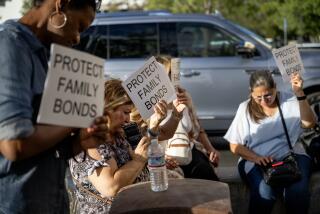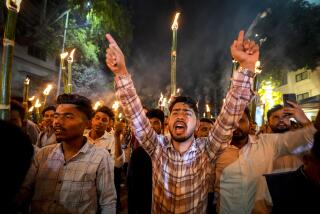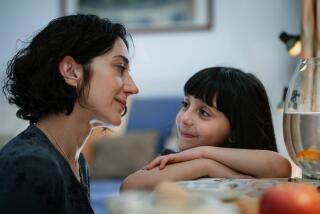From the archives: Family relies on Muslim values even as traditions fade
Mohsin Zulfiqar has a shock of white hair, a white bushy mustache and an intellectual air that bring to mind an Indian Einstein — though not as absent-minded, he jokes.
His wife, Khawar, small and aristocratic in her bearing, is the image of her grandmother, whose full-length portrait hangs in the Zulfiqars’ sitting room. But instead of a sari, Khawar is found in thoroughly modern slacks and sweaters on workdays.
Their son, Raza Ali, has a James Dean quality, all coiled rebellion and alienation. A faux diamond in his ear lends a touch of bling, and he listens to hip-hop music, with its vulgar honesty, four-letter words and political awareness.
Daughter Munizeh exudes calm, but her demure exterior masks a passion for Bollywood dancing. She shocked her progressive-minded parents by declaring her intention to marry a cousin from India. (Everyone assumes it is an arranged marriage, she complains, when it was just the opposite.)
A normal family: four lives under one roof, intertwined, but each an individual. Immigrants from South Asia, Mohsin and Khawar have created a space for themselves and their children to develop and to find identities in a country and on a continent that are, and are not quite, their own.
Their secret: No matter what goes on outside their front door, respect, love and trust are what they give to, and expect of, one another.
Like other members of Britain’s growing Muslim community, the Indian-born Mohsin left his home — in Pakistan’s teeming, chaotic city of Karachi — to seek a better life in the green folds and murky weather of England.
In his case, the English north, then the bustling home of manufacturing and textiles, beckoned. He came to get a doctorate in Nottingham and ended up staying, first in Manchester, now in Leeds, where he is a manager in the city’s school system.
“If not for my dad,” Raza Ali says, “we would be a typical Asian family.” The 22-year-old leans back in an armchair in the sitting room, decorated with bric-a-brac showing the family’s wide-ranging interests: decorated wooden spoons from Russia, framed pieces of Egyptian papyrus, a small bust of Vladimir Lenin and a painting of a 19th century ancestor who served as a provincial governor in India.
“My dad came for education. He came as a student. But a lot of people were from very poor, uneducated backgrounds, so when they came here they went straight into jobs straight to the mills,” Raza Ali says. “For these people, integration, they did not have a lot of it, and their children, my generation, cannot integrate with people from other cultures as well as me and my sister.”
After 34 years here, Mohsin, a few weeks short of his 58th birthday, has done well. He drives a BMW. He lives a comfortable suburban life in the affluent Roundhay section of Leeds. And he is a respected activist, professionally and voluntarily, constantly at meetings against racism and poverty and working in behalf of minorities, no matter their ethnicity or religion.
Mohsin, who loves the freedom-inspiring music of Bob Marley, says he is passionate about education, for all children, black or white. But his experiences show that it is a hard road up for non-English in British society.
“To break into middle-class jobs was a hell of a problem,” he says over takeout Indian food in the family’s small kitchen. “You really had to prove that you were better than some of your colleagues . As an Asian, you have to have put more hard work into your job.”
But while Mohsin has been waging his war to break through the invisible barriers of British society, he has also been alarmed by the rise of religious fundamentalism in his own community. Three of the four suicide bombers responsible for this summer’s London transit bombings lived a short distance away in Leeds.
“Fundamentalism has increased in this country, and many, many other countries,” he says.
He recalls visiting a friend whose 3-year-old son was just learning to speak. The man asked the child what he would be when he grew up.
“Mujahed” (holy warrior), the boy said promptly.
“That shows the kind of things that are going on in this city, maybe in other cities as well,” Mohsin says. “People are brought up in that kind of ideology.”
Khawar is similarly concerned. When she revisits her home in India, she can see how the madrasas — the Koran schools — are flourishing, compared with when she was growing up. And she fears that a similar phenomenon has come to Britain.
“When my children were about to go to university, we said to them, ‘Keep away from those people. Because once they catch you, they won’t let you go. They will brainwash you,’ ” says the trim, neat Khawar, who is nearly a decade younger than her husband. “It’s kind of a cult, and they will take you and your family,” she warned.
As a counselor at a mental health center, Khawar says she sees the strain that the children of Asian immigrants go through.
“Obviously, the parents still have the old beliefs and they put restrictions on the children,” she says. “They don’t have the freedom my children have, so there is always conflict within the family.”
In her own family, Khawar uses a light touch. There were never any attempts to keep Munizeh shut in at home, as many other Asian families do with their daughters. Nor did the family raise any objections when Raza Ali became seriously involved with non-Asian girlfriends. (Mohsin says he imposed only one rule: that Raza Ali had to be sincere and not take advantage of the girls.)
“They never hide anything,” Khawar says of her children, with a hint of pride. “The only thing I told them, ‘Look, whatever you do, just be honest. If you lose your honesty, things start falling apart.’ They understood that.”
There was one surprise, however. The Zulfiqars had gone to India to visit family last December. While there, Munizeh became reacquainted with Raheel, her aunt’s son. Although marriages between cousins are common in much of the world, it is something that Mohsin and Khawar had not wanted for their children, in part because they are cousins too.
“We decided that our children wouldn’t get married to cousins, because we don’t want too much in the family,” Khawar says. “I don’t know what happened; it was really love at first sight.”
How did Khawar find out? “Too many sources,” she says with a laugh. “First of all my brother’s daughter came and told me, ‘Auntie, I think there’s something there.’ I said, ‘No, no.’ Then I watched them and I thought, maybe, yes.”
Finally, the young ones made the announcement.
Mohsin, who is sitting beside his wife as she tells this story, was not thrilled. “Oh, but he was very angry,” Khawar says. “He was angry about the cousin thing.”
Raheel, who is 24, has recently moved into the household, sleeping in a basement room, pending the betrothal. He has quickly formed a bond with Raza Ali, become a second son to the parents, and brought with him a new note of religious observance.
“He does his prayers and fasting and all of that,” Munizeh says with the wonder of someone who wasn’t brought up in an overtly religious family. “He has already influenced me. I learnt to pray, and I never used to pray, and now I am determined.”
Raza Ali uses rough language, drinks alcohol (but not to get drunk, he insists), does not always follow an Islamic diet and does not pray. But he likes Raheel a lot — although he admits he was blown away when his sister chose someone from “the old country.”
“He is a good Muslim all the time,” Raza Ali says. “He doesn’t swear. He has got total respect for my sister.”
Raza Ali has no time for hypocrites. He remembers hanging out at a pub with some friends when a Muslim “associate” admonished him for having a hamburger made with non-halal meat.
“I say, ‘Firstly, you are sitting in a pub, a house of sin. You’re building up a spliff [a joint]. You drink liquor. You smoke coke. You go out with women. Your parents don’t know any of this. And you’re calling me a kaffir [unbeliever]? At least I am true all the time.’
“These people are bad Muslims, and they call themselves good Muslims. That is why it will never work; that is why this religion will never work in this country.”
He is passionate about politics, infuriated by the wars in Iraq and Afghanistan, convinced that the mass media are telling lies, and he is sympathetic to Palestinian “freedom fighters.” But not to the London bombers — they should have attacked military targets first, he suggests. He finds himself feeling alienated from the system, and surprised that he gets along so well with his English girlfriend’s stepfather, a tough, tattooed mechanic.
“You know what it is? I want to make change, but I can’t, because the system that operates won’t allow you. It is too hard,” he says. “You either have to be very, very rich, born into money, or you need to come up with a bloody good idea to make you a lot of money, then make change. Otherwise you can’t do anything.”
The 20-year-old Munizeh has a much more pacific take on her life, but is equally committed to being true to her values as she sees them. She has decided not to don the hijab, the Muslim head scarf.
“One thing that stopped me was my dancing, because I perform from time to time. It was a bit of a weird clash — religion or my hobby. Somewhere there, my hobby won.” Although a believer, she says she regards the scarf as unnecessary. “Why show the world what you believe? What you are is really inside you.”
Among her family, Munizeh stands out as being the most immersed in her culture and background. She says she loves visiting her large, extended family in India — loved ones all around, the piousness, the respect that she gets there as a young woman.
She studies criminal justice at university (both she and her brother, who is studying marketing, will graduate in 2007) and works part time, but she has few friends who are not South Asian.
In part, it is too awkward for her. Her non-Muslim cohorts have different values. They go clubbing. They meet at the pub. None of that suits her. She’d rather go out to eat with a South Asian friend or watch a Bollywood movie at home than feel uncomfortable about making others change just for her.
After a certain age, social segregation of Muslims and non-Muslims occurs spontaneously, as just a fact of life, she said. When she was in high school, the South Asians all went into the corridor during breaks, the non-Asians stayed inside the hall. “It was so obvious,” she recalls. Teachers did nothing. “Why should they care? Britain’s supposed to be very multicultural, but when you get down to it, you can see the separation.”
It creates identity problems for the European-born Muslims of her generation.
“When [British nationalists] say, ‘Go back to your country,’ you think, ‘Go back to where you were born?’ I just want to say, ‘Should I go back to Manchester? Because I really do like Leeds,’ ” she says sarcastically. “Until we are recognized as being British, how are we going to feel British? We can’t be seen as outsiders anymore.”
In her broad northern Beatles-like accent, with a traditional stud in her nostril adorning a face framed by long, thick black hair, she adds: “I am an English girl that’s Muslim, and I think I’m allowed to be both.”
More to Read
Start your day right
Sign up for Essential California for news, features and recommendations from the L.A. Times and beyond in your inbox six days a week.
You may occasionally receive promotional content from the Los Angeles Times.






